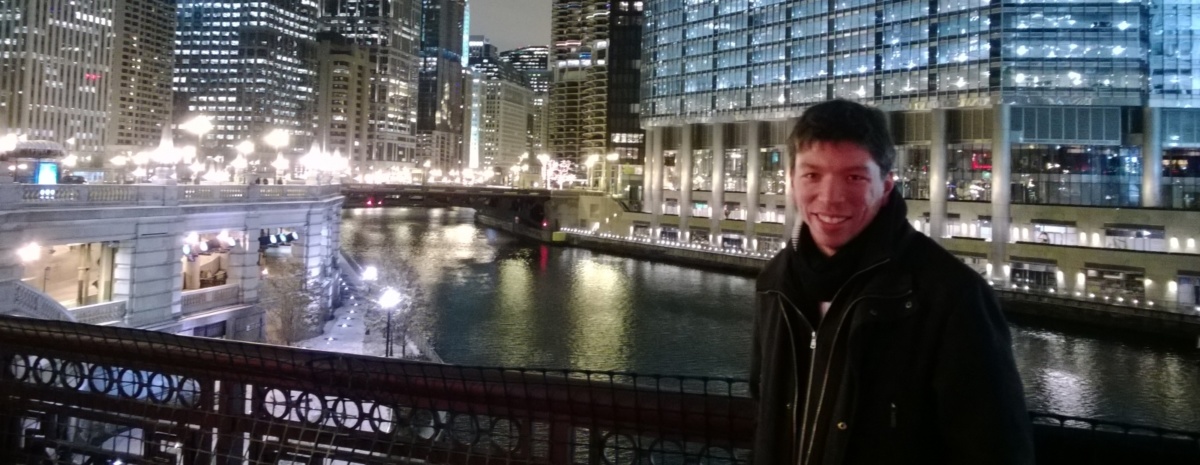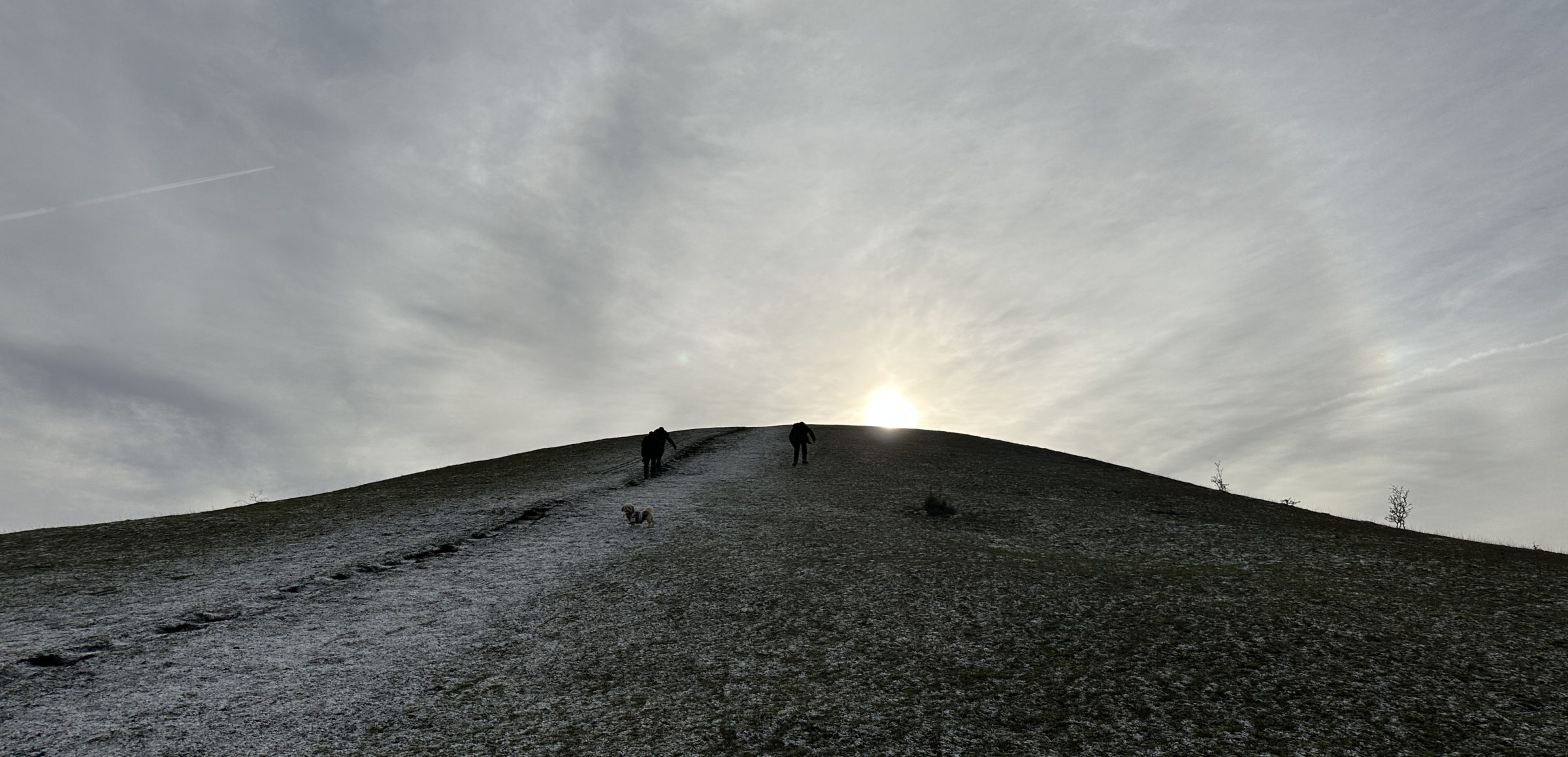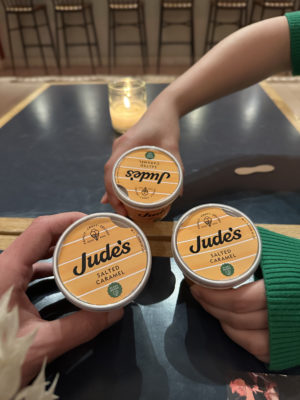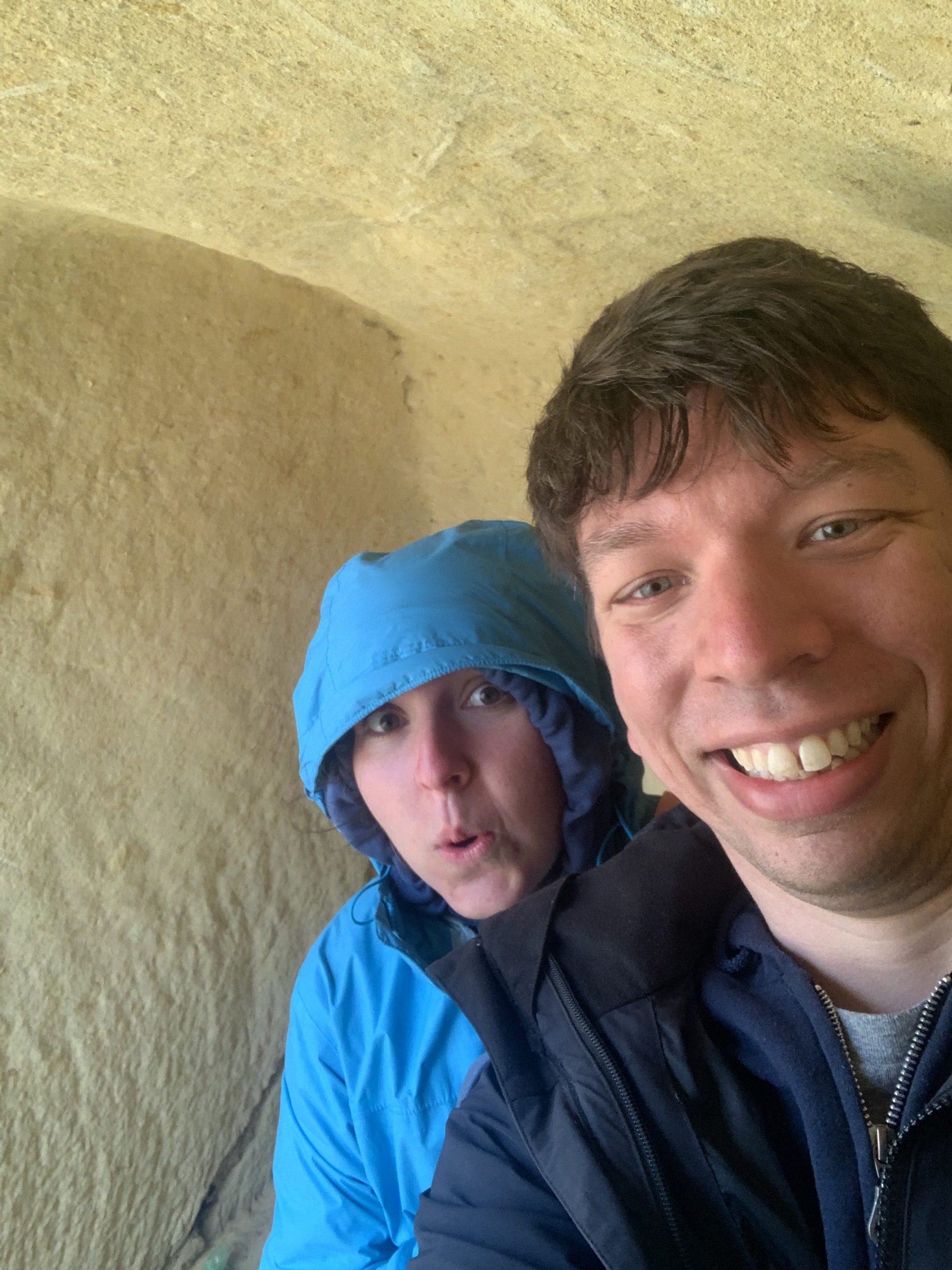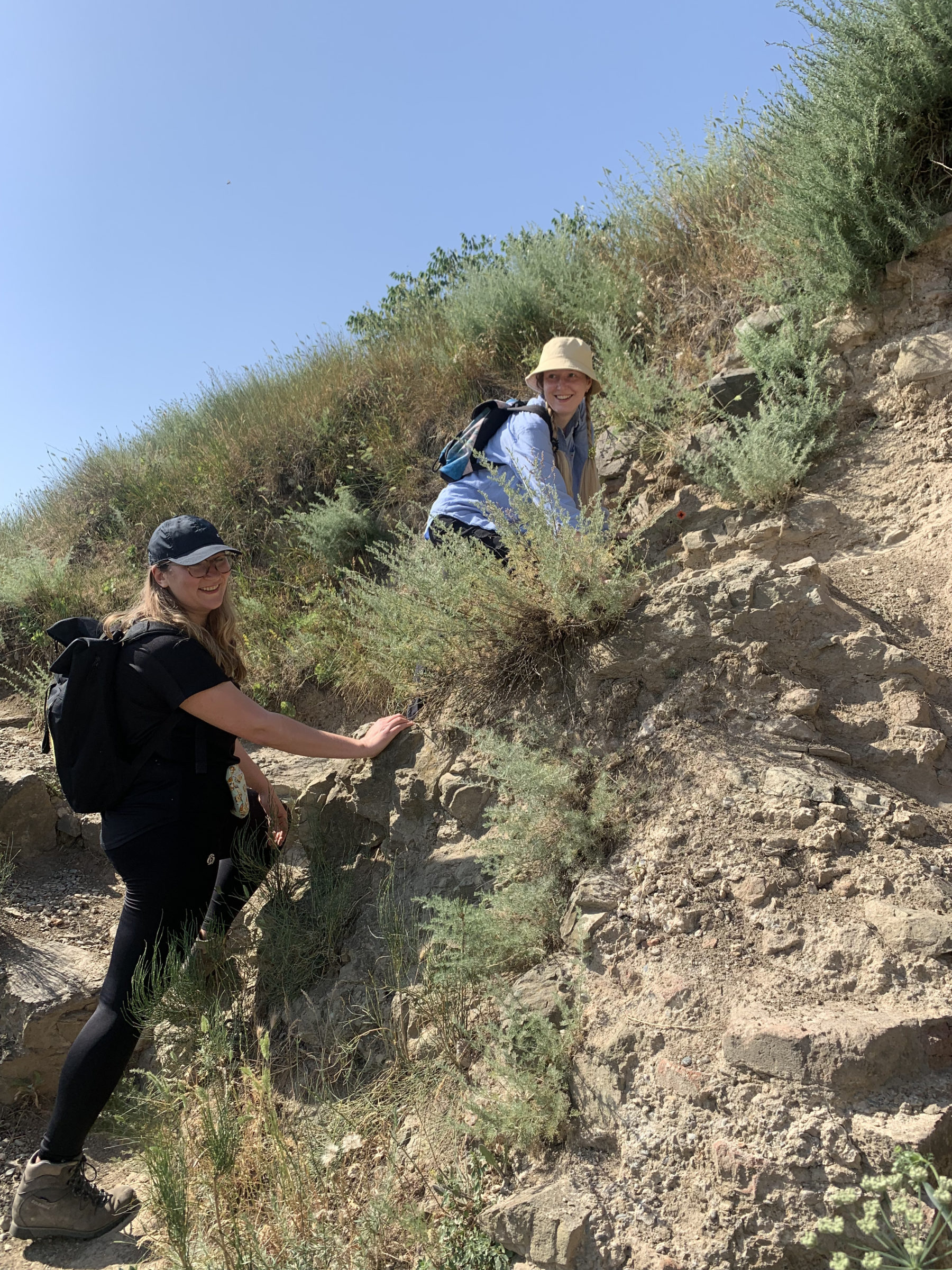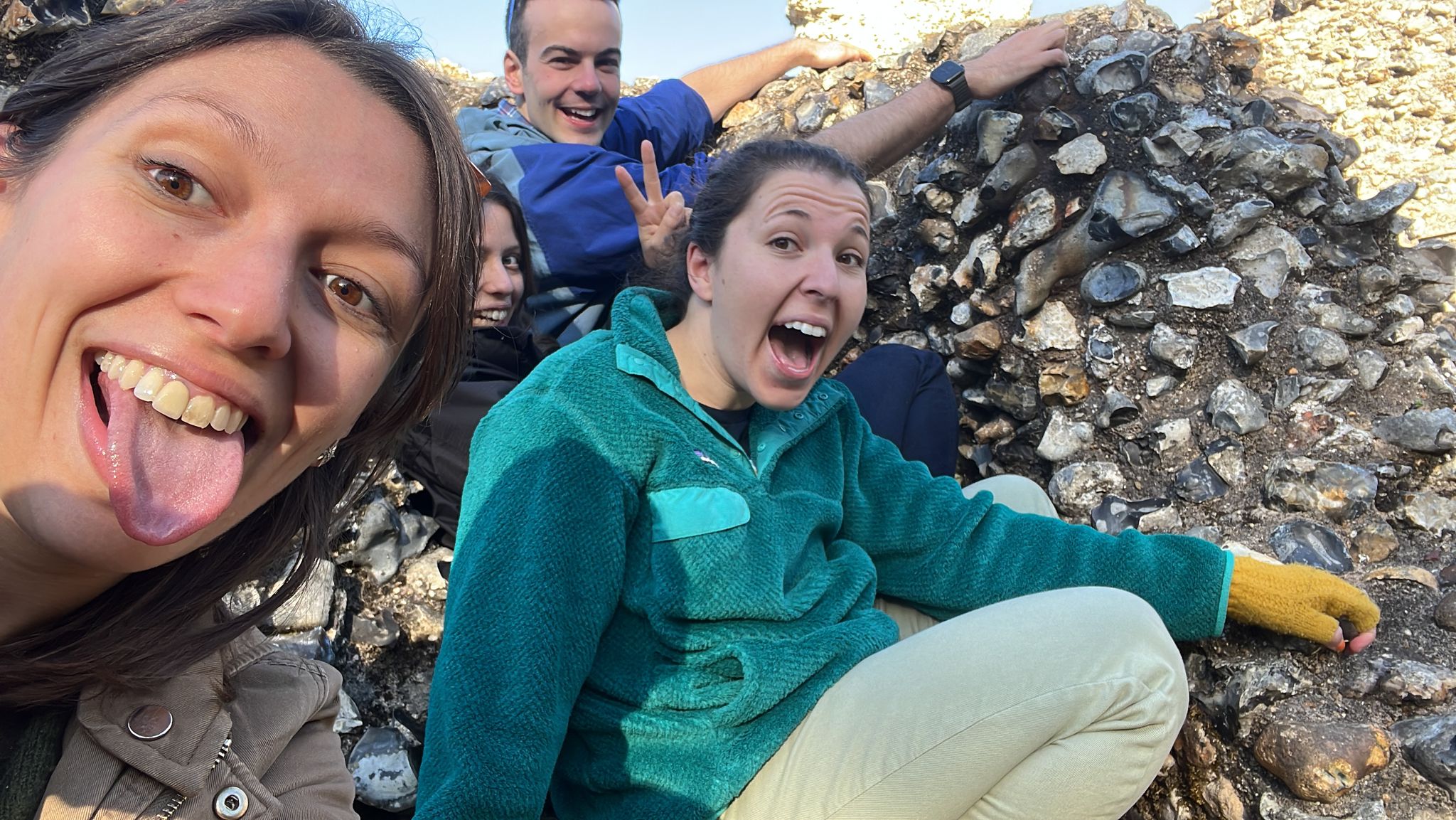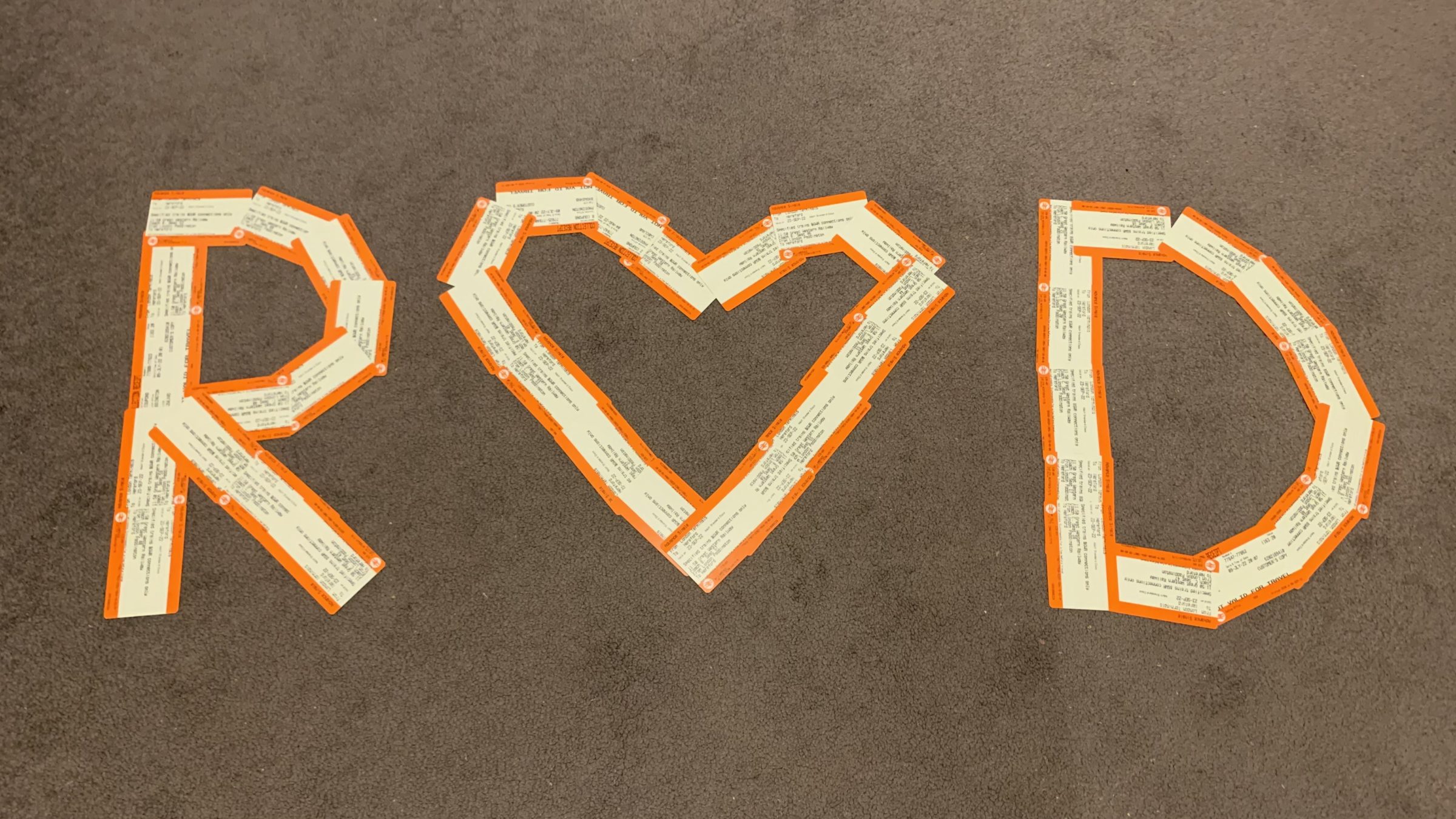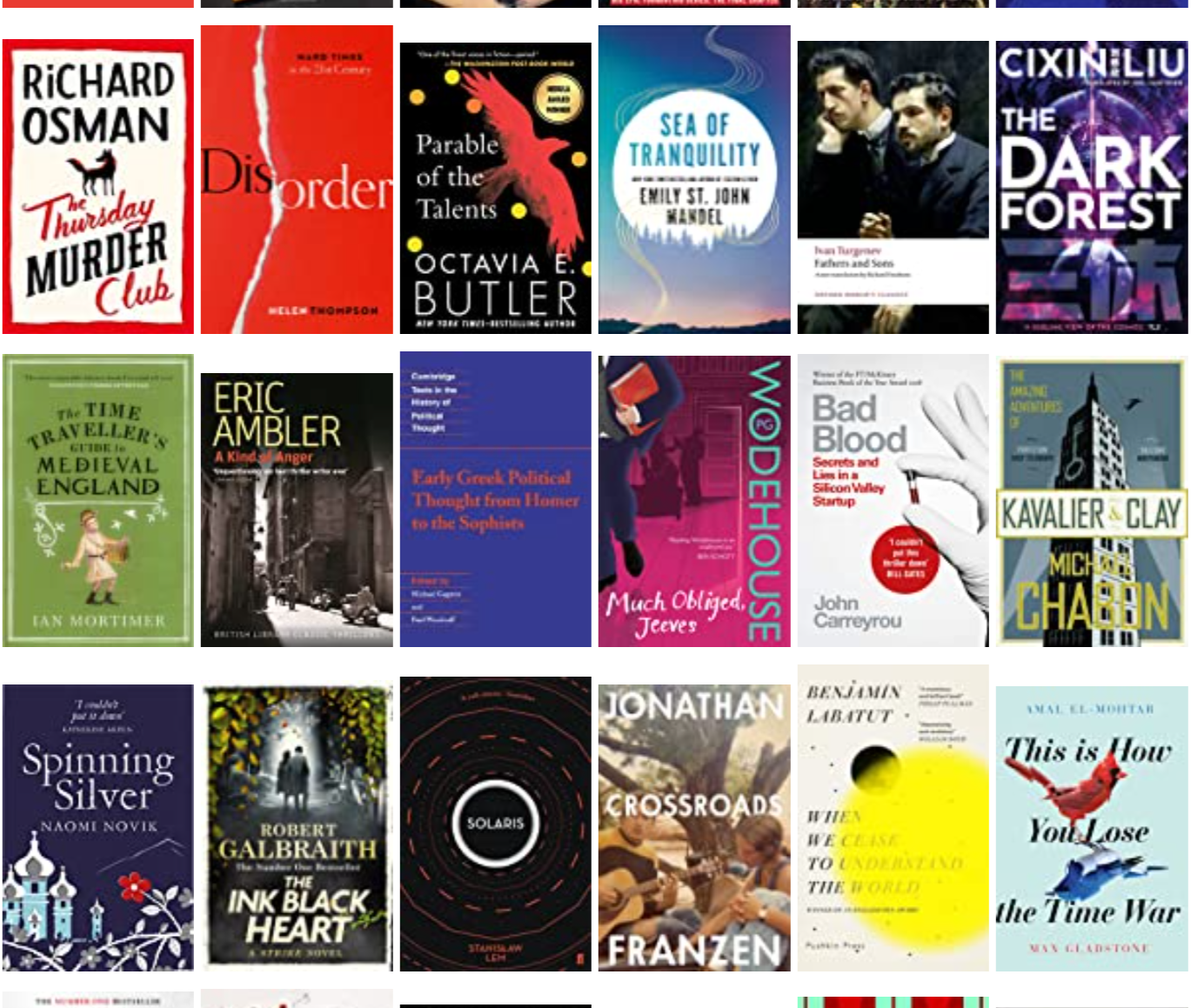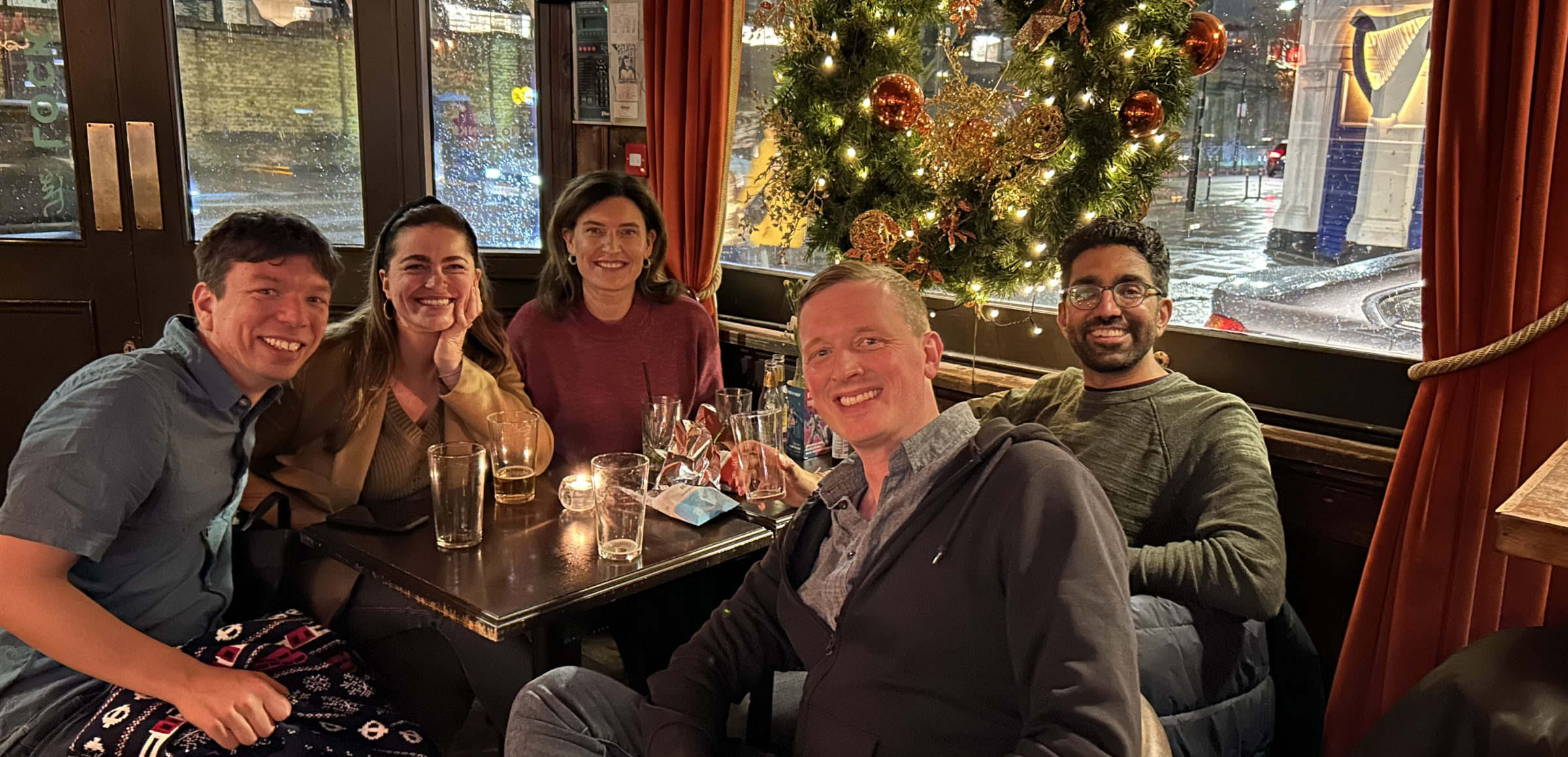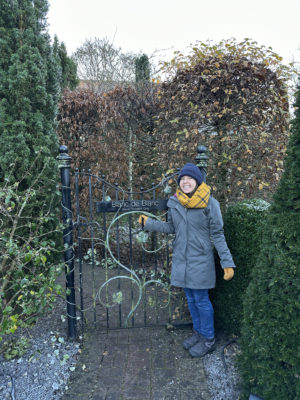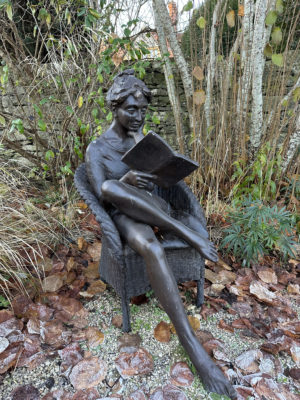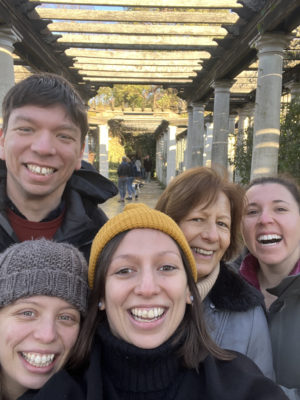Come on blog readers, you know the drill by now. Posts in late December are a whirlwind tour of food, drink and happy gatherings. Then there’s an awkward silence for a couple of weeks in January until I pop up with a couple of frosty photos from some long walks. If Randi was writing this blog, things would actually be a bit more interesting this year, as she spent the first half of the month hanging out in New York and Chicago. Instead, you’ll have to put up with my stories about lounging on the sofa and binging on the final season of His Dark Materials.
Spoiler alert: it was really good! The third and final series of His Dark Materials, I mean, although our sofa is also perfectly comfortable. They certainly didn’t shy away from the theology at the heart of the books, and it’s funny to think about how much of a fuss this might have caused in an earlier age. I did find the structure of the final episode very odd, although not in a bad way. All of the major story arcs were already wrapped up in the penultimate episode, leaving a whole hour for Will and Lyra to basically hang out and relax – with some very half-hearted jeopardy thrown in – before the plot turned up again and demanded their heartbreaking separation we all remember from the books. I liked it, and it gave the characters room to breathe, but “in my day” of linear TV I don’t think you’d ever have gotten away with that.
(On the topic of not shying away from theology: a guy showed up at our front door the other week, Bible in hand, and I think I must have out-talked him because after a while he just smiled absently, made his excuses and said he really must be leaving now. As if I had knocked on his door!)
Anyway, when I wasn’t either watching or working during 2022’s Christmas/New Year interregnum I was either frantically blogging (you’ve already read those ones) or at the Kiln Tricycle Theatre courtesy of mum to see Zadie Smith’s The Wife of Willesden, an adaption of Chaucer’s ‘The Wife of Bath’s Tale’ from the Canterbury Tales. The odd thing about this is that I should have loved it. I mean, it’s literally set in a pub in Kilburn, it’s Zadie Smith, and all of the performances – especially the starring role – were fantastic and full of life and wit. But, for me, I’m still just a bit limited by the underlying source material. I like my fiction to be a bit more narrative-driven, and that’s just not what you got in the 14th century.
I spent most of New Year’s Eve working longer hours than a typical workday to finish my annual book review, but then rewarded myself with a dash up the Northern Line to spend the night in High Barnet with Oliver, Abi and Robin. They had spent their evening’s energies on cooking a delicious lamb stew (much more useful than a book review) and we spent the night – and much of the following day – playing Love Letter, Splendor and some questionable rounds of Debatable. As usual it was also really lovely to see Oliver’s parents again – who manage to feel like parents I grew up around even though I only know Oliver from uni – as well as Abi’s sister Sarah, who came round to see us on New Year’s Day.
Of course, by “came round to see us” I really mean “came round to see Robin”, who is already so much bigger than the very, very little Robin we saw at our wedding. A few weekends later in January, after Randi was back in town, Robin was also the star attraction when the five of us travelled to Cambridge for a fabulous mini-reunion with Peter Mandler over a pub lunch. It was a perfect setting: warm and cosy, with plenty of space to sit and talk as we covered all of the major topics you’d expect and barely noticed by the time it was already dark outside.
I did promise a long walk, however, and January’s long(ish) walk comes courtesy of Erin, Antonis and Diva who invited me to join them through the Chilterns from Little Kimble (a station which appears to be an outgrowth of someone’s back garden) to Princes Risborough (bigger, but where the chippy is still closed on Sundays). I particularly enjoyed playing a classic game of #TeamHulme vs. #TeamKant on the train there.

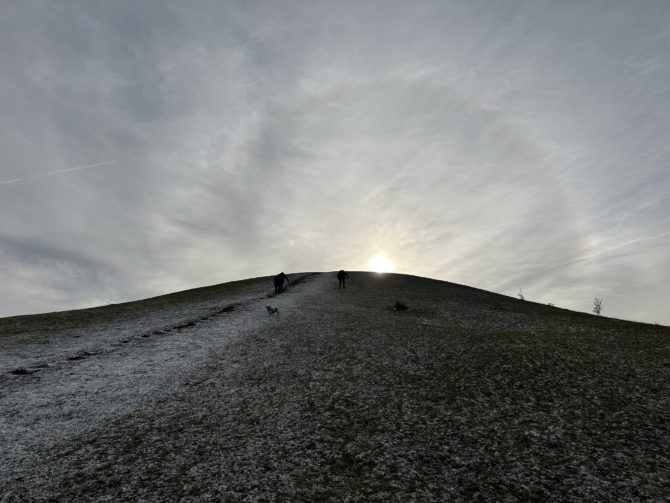
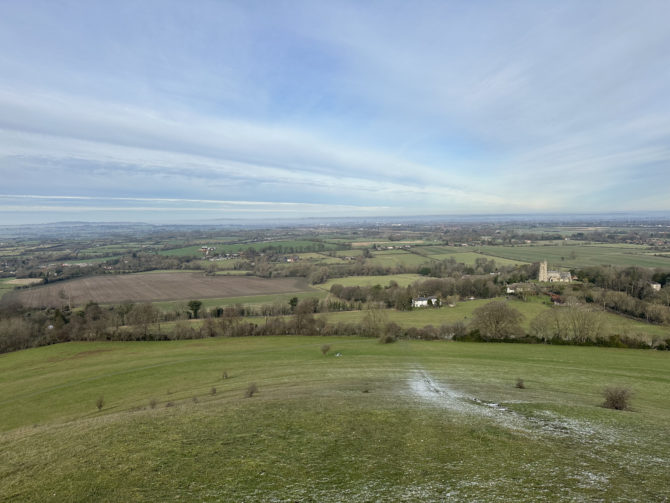
Unusually, last week involved two separate day trips to Windsor for work reasons, so (naturally) I took the opportunity to compare the Waterloo train (for Day Trip #1) to the Elizabeth Line to Slough (for Day Trip #2). This was my first time really using the Elizabeth Line to its full potential rather than treating it as a very very nice Tube line, and it really is a gamechanger to be able to ride seamlessly all the way out from Whitechapel. Not only does it extend the beyond-London zone of places which still “feel like London”, but it also made me think of parallels with US intercity highways which go right through cities. If someone drove from out of town to our flat in Chicago, for example, they wouldn’t have to turn off a motorway until the last few minutes. This is completely different to driving in a city like London (from an airport, say) which quickly requires drivers to hit slow, residential streets.
The downside of building motorways through cities, of course, is that they completely destroy large chunks of it, either by demolishing it directly or through a combination of noise, pollution, neighbourhood severance and general ugliness. The concept of the Elizabeth Line feels like the public transport equivalent of a highway through a city in terms of speed and convenience, except through a tunnel which leaves the area above almost entirely unscathed. It’s so lovely. Can we build Crossrail 2 now, please?
When I wasn’t admiring purple roundels on these trips I was involved in a (pleasingly rewarding) focus group session on Tuesday, after which we had an opportunity to visit Cliveden House for drinks and a short tour. (UK politics shorthand: this was ground zero for the Profumo Affair.) I also had a great catch-up over Honest Burgers with Tim, who I always enjoy conspiring with.
Otherwise, Randi and I have been balancing work, honeymoon preparations (we’re all travel vaccinated up… even with the ones we didn’t really need!) and our unofficial second jobs for Kirsty’s selection campaign in East & Midlothian. With apologies to our local MP, Ellie Reeves – who we were delighted to meet recently at a local gathering alongside some very grown-up chats with our local councillors about road crossings – but our real campaigning hearts lie in getting Kirsty selected, because she is someone we really believe would make a positive difference in Parliament. To that end, we hosted an evening phonebank for volunteers (it being both thrilling and nostalgic to hear the sounds of voter conversations coming out of every corner of our flat) and travelled to Edinburgh last weekend for some old-fashioned door knocking.


After a very full and rewarding Saturday of campaigning, the two of us crashed at Katie’s flat for the night before spending some time with Katie and James on Sunday. While Randi was out running, the three of us hit up the National Museum of Scotland for their Doctor Who Worlds of Wonder exhibit, which feels like the latest in a long line of Doctor Who exhibitions in science museums which make a commendable effort to be educational (“guess what, your cells regenerate too!”) but are really just an excuse to admire the the TARDIS console and hide from monsters. We did also go and see Dolly the Sheep, though!

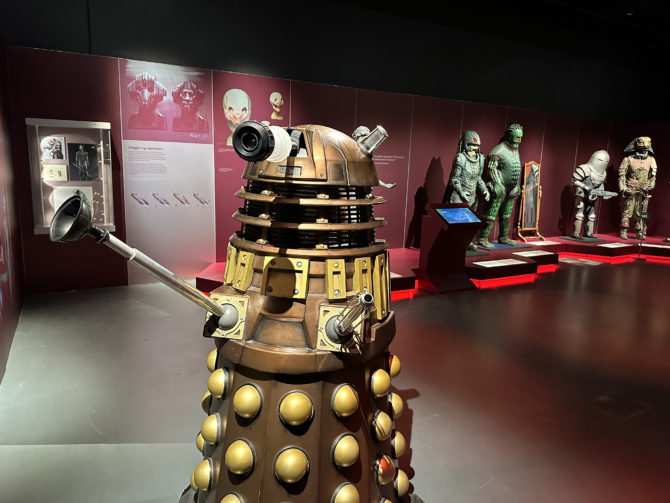

This week we’ve also had the pleasure of having Sam staying with us in the evenings… which just about brings this post up to the present (he writes, briefly looking up to offer uninformed opinions on Sam’s potential retro trainer purchases). And just in time, since – depending on when you’re counting from – on Friday night Randi and I leave for either our slightly belated or extremely belated honeymoon. I feel like we’ve been preparing ourselves recently by revisiting some previous holiday destinations in restaurant form (amazing Peruvian food at Tierra Peru, Georgian khatapuris on Holloway Road) although in every other way we are probably grossly underprepared. But very excited!
For the past 15 years I’ve written my annual review in a dense month-by-month format. That’s 180 individual months! But now, in a thrilling burst of innovation, I’m trying something a little different…
Annual Roundup
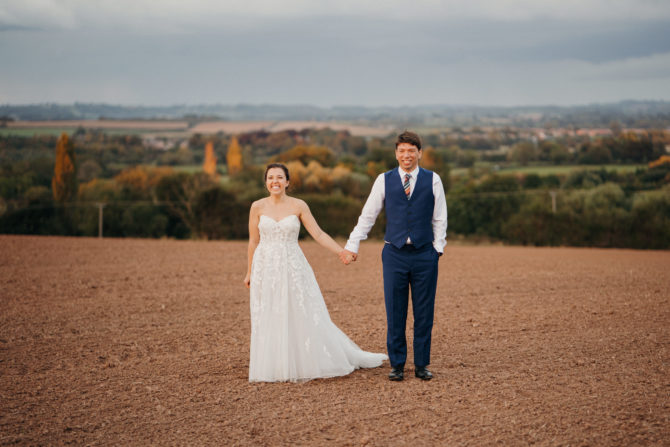
The year of the wedding! Five years after our Chicago courtroom marriage, Randi and I had our real/fake wedding (depending on how you look at it!) on a sunny September day.
It won’t surprise you that Randi was also my walking partner when we completed the Capital Ring with our triumphant return to the Woolwich foot tunnel. She also packed our flat with friends for my surprise birthday party, joined me to ride the Elizabeth Line on its first day and smiled when I played the entire Welcome to Mountport soundtrack instead of letting her sleep. Domdi was going strong long before our wedding day, that’s the point. But it was a wonderful way to celebrate.
An odd irony about 2022 is that it was almost entirely a resolutely post-Covid year, and yet this was also the year when we both finally caught it. The timing happened to coincide with Russia’s invasion of Ukraine, an event which threw everything up in the air for some people close to me, so it was a weird and unsettling time. It’s a reminder of the sharp turns life can take, as was the sudden death of my great uncle Leonard, who we lost without warning in April. We miss you.
Travels
- Amsterdam (March) – A brief overnight trip with Lee for a work conference. We left the after-party early for the Dutchiest of tourist Dutch dinners.
- Norwich (April) – Group trip to see The Lion, The Witch and the Wardrobe in which we were all kindly hosted by Jason and Helen overnight. To make sure we got to the theatre on time, I paid our restaurant bill in one go, misleading the waiter into thinking I was the team manager on a jolly work outing.
- Malta (April) – Long Easter weekend with Randi and her parents. We walked all around the beautiful Valletta, rode our quad bikes on a tour of Gozo and relaxed in the rarefied atmosphere of the M Club. Also, Beth narrowly avoided murdering several high-ranking diplomats with her crutches
- Tbilisi (June) – A week of wine-fuelled work with my wonderful colleagues Kira, Maria and Hanna. I loved everything about this impulsively-booked gathering, from the stunning scenery to the delicious khachapuri, but nothing could top hanging out with this gang in person after years of meetings on Zoom.
- Cardiff (July) – A very cheerful and sunny weekend in Wales to see Tom, Demelza and Ralph. We still fantasise about popping back to Hard Lines for breakfast.
- Hereford (July) – Pre-wedding scouting expedition with my mum, during which Randi found the perfect painting we’d been looking for.
- Valencia (August) – As close to the UK as Mike was willing to come on his European trip, rudely forcing us to fly to Spain, eat a lot of tapas and swim in the thrillingly warm waters of the Balearic.
- Edinburgh (August) – Or “Dom finally gets to see the Fringe” with our guides Katie and James!
- Hereford (September) – The One Where We Got Married (Again)
- Suffolk and Cambridge (October) – Family pilgrimage to Knettishall Heath to scatter my dad’s ashes, followed by lots of fun and games in Bury St Edmunds. Cambridge was a bonus stop on the way home for me and Randi, who resisted the lure of the very expensive artwork in the gallery at the top of the Grand Arcade.
- Whitstable (November) – Michelin-starred weekend at the seaside put together by Caroline and Josh.
- Oxford (December) – Outrageously generous seven-course wedding gift paired with a night at St Hugh’s and a Christmas market bratwurst.
Live!
- The Book of Dust – La Belle Sauvage (February) – A lovely stage adaption of the first book in Philip Pullman’s newer series, and my first post-Covid play. Randi got very angry at the League of St Alexander.
- The Lion, The Witch and the Wardrobe (April) – Oliver’s dad is Father Christmas!
- Dear Evan Hansen (April) – A steady growth of nervous tension in the pit of your stomach as you wait for Evan Hansen’s Big Lie to be punctured. With songs.
- The Book of Mormon (May) – For Randi’s birthday, an experiment to see if this musical would still hold up all these years later. It did! Although they definitely softened one of the worst-taste jokes.
- Flightpath (May) – Surrealist stories in the perfect back-of-a-pub small theatre setting, with our neighbour Angela.
- Jerusalem (May) – Probably up there as one of the best plays I’ve ever seen.
- Ramona (June) – Georgian puppet theatre in which a lovesick train joins a travelling circus. Yes, you read that right.
- Underground 2099 (June) – Escape room set in a real abandoned Tube station, featuring giant radioactive rats which I was too squeamish to touch.
- Shamilton (August) – Fringe Show #1, and also the best: a glorious improvised musical on Nicola Sturgeon which brought back very warm memories of Improv Shakespeare in Chicago.
- Any Suggestions, Doctor? (August) – Fringe Show #2, and a Doctor Who-themed improv which was pleasantly enjoyable but no comparison with Shamilton.
- 10 Songs for Geeks (August) – Fringe Show #3 – Silly songs from Jolly Boat playing to an enthusiastic ‘Last Night’ crowd.
- Chris McCausland (November) – Stand-up comedy. One part gentle, one part serious exploration of blindness.
- Monopoly Lifesized (November) – Everything you need to know is right there in the title.
- Ingrid Michaelson (November) – Could there be any better start to the festive season than Ingrid Michaelson singing a mix of Christmas songs and her biggest hits?
- Six (December) – Divorced. Beheaded. Live!
- A Sherlock Christmas Carol (December) – A concept so good that I had very high expectations, and was not disappointed.
- The Wife of Willesden (December) – Post-Christmas update of Chaucer’s ‘Wife of Bath’ from Zadie Smith. Superb performances.
On Screen
- Doctor Who – A trilogy of specials for Jodie’s final year, featuring an entertaining performance from Aisling Bea in Eve of the Daleks at New Year, Easter’s disappointing Legend of the Sea Devils and the blowout celebration of The Power of the Doctor which was, well, ace. Katie and I also had several classic Doctor Who Nights in 2022 as well, but only one of them attempted to pull off a musical western. So come, you coyotes / And howl at the moon / Till there’s blood upon the sawdust / In The Last Chance Saloon…
- The West Wing – We did it! We finished! American democracy secured, and it only took us four and a half years.
- The Green Planet – I seem to remember at the time we poked fun at David Attenborough running out of animals to film, but some of these plants have really stuck in my head. Especially those intelligent tree roots.
- F@ck This Job – The inside story of what it takes to run an independent TV station in Russia, until it gets shut down.
- Succession – Recommended by Tash, we managed to complete the first two seasons this year. Great fun in itself, but also good because it set me up to chuckle when someone set Rishi Sunak’s leadership video to the theme tune.
- Oxide Ghosts – “Hiya did I remember correctly that you really liked Brass Eye? Did you hear about the outtakes screenings?” (thanks mum!)
- Eurovision – Joined by Cat for the final to enjoy the UK’s shocking reversal of fortunes.
- Football Dreams: The Academy – Unexpectedly moving series about Crystal Palace’s youth academy.
- Our Friends in the North – Started this year after a gift from Randi’s former boss – but we haven’t yet reached the 80s, so I fear the worst may be yet to come.
- Glass Onion – Our only actual-proper-film-in-a-cinema outing this year… and if you’re only going to have one, you really should make sure it’s a great one. Fortunately I loved this Knives Out sequel featuring Detective Benoit Blanc and a murder mystery party on a billionaire’s private island.
That Moment When…
- …in the wave of Wordle clones which sprang up this year, the one Randi and I spent many nights puzzling over together was Redactle
- …you sit for ages through a virtual Labour Party re-selection meeting for the results of the secret ballot to be revealed, only to find out that everyone’s voted the same way. Like playing Mafia without any mafia
- …Randi freezes her hands playtesting Tash’s scavenger hunt birthday gift in the pouring rain
- …you become intensely paranoid during a tense cat-and-mouse hunt around Bury St Edmunds after rashly promising to Katie that she can’t poke you without you spotting her first
- …you arrive too early, leave half the cork marooned in the wine bottle, break the fairy lights in the garden and seriously consider faking a sudden illness
Wishing everyone a very happy and healthy 2023!
And remember, no home run is worth it if you can’t run home to a home you love…

Finally: a (very slight) reversal in fortunes for my reading total! This year I managed 30 books, up from 29 in 2021, and the only thing it cost me was my peace of mind after spending New Year’s Eve immersed in a claustrophobic Gothic thriller. But more on that later…
Fiction
It may be a self-fulfilling prophecy, but once again the first book I read this year – Fatherland, by Robert Harris – turned out to be one of my favourites. First published in 1992, this was Harris’s debut novel and the one which made him famous, no doubt driven by our perpetual collective fascination with Nazi history. Fatherland is a classic of alternative history, set during the 1960s in a victorious Nazi Germany which diverged from our own timeline after 1942. The use of real people and events from our common history until that point makes this imagined world feel chillingly familiar, and the story itself is a captivating detective thriller which, at its heart, is more interested in unearthing the (real) events of the Wannsee Conference than solving a totally fictional mystery.
While my first Robert Harris novel was a hit, my first Jennifer Egan novel – Manhattan Beach – was more of a miss. Indeed, Todd and Carolyn were surprised that this was the one I picked to read, and the book’s promised intrigue was never really parlayed into a strong emotional connection to the characters. For me, the most moving section was when Anna – the first female diver at the Brooklyn Navy Yard – dives successfully for the first time. I had similarly mixed views about The Poisonwood Bible, Barbara Kingsolver’s book about an American missionary family living in the Congo. The fact that the four daughters are a little too cleanly well-defined, bordering on caricatures, made the story easy to follow but less good than it could have been. It also felt like the climax arrives prematurely, with the family’s great disaster and subsequent exodus concluding long before the final page.
One book I did love in 2021 was The Three-Body Problem, and the second book in the trilogy – The Dark Forest – was also incredibly good. I found it slower to get into at first – it took me a month to finish! – but overall Liu Cixin avoids the classic middle-book problem by adding an impressive cocktail of new ideas and concepts. Quick summary: faced with a slow-moving but overpowering invasion force, humanity devises the Wallfacer Project to give four individuals (‘Wallfacers’) incredible unchecked power to work on secret counter-strategies. Added to this are ‘Wallbreaker’ opponents, hibernation into the future and – ultimately – a crushingly dark explanation for the Fermi Paradox from which the book gets its name. I’m so excited for the final installment!
This year I also made a return visit to Octavia Butler’s two-part dystopian ‘Parables’ series for Parable of the Talents. This is relentlessly grim and depressing, with a level of violence which can feel gratuitous and inescapable. Nevertheless, there’s a deep cleverness in how Butler presents Lauren, the original book’s hero, as a delusional cult leader through the retrospective eyes of her daughter Larkin. How are we supposed to feel about Lauren, really? Butler is deliberately ambiguous, but for me I couldn’t shake the feeling that her single-minded dogma might still be basically correct. And if you read the book this way, the final chapter – where humanity finally takes a small, shaky, horribly imperfect step towards Lauren’s spacebound future – is a moment of hope. I was also fascinated by the scraps of information available on Butler’s aborted third book in the series, Parable of the Trickster, which exists only as dozens and dozens of false starts in the archive. Such a tantalising glimpse into what might have been.
Solaris was a gift from Tash and a really interesting book to think about, especially since we know that the author, Stanisław Lem, didn’t think much of the English translation. The basic science-fiction concept of a vast, mysterious, sentient but unknowable ocean planet is compelling, but it can be difficult to keep the pace through the first-person narrative, and the lengthy academic biographies of the Solaristics are very boring. (And yes, I do realise they’re supposed to be.) Once I finished the book, though, I was struck by a rebellious feeling that humanity actually acquits itself rather well. Solaris is partly about the inherent limits to our capacity to understand something truly alien, and the point of the tedious academia is to show that science is – to some extent, anyway – doomed to stumble around in our anthropomorphisms forever. But actually, a lot of the theories and observations made by the scientists feel like they are useful pieces of a puzzle, and do contain some truth, even if a neat and tidy explanation (or mutually satisfying alien ‘contact’) is never reached. So, no need to be so pessimistic!
Sadly, it’s also true that the obvious racism and sexism in Solaris is grating, even if the book still stands up as a whole. Things are less clear for Evelyn Waugh’s Decline and Fall, which bumbles along as a light-hearted social satire (unassuming scholarship student Paul Pennyfeather is kicked out of Oxford after becoming an innocent victim of some drunken toffs, before finding a teaching job at a rundown boarding school) until the appearance of a black character, Chokey, at the school sports day. Repeated use of the n-word follows. I’m not trying to censor the book out of the universe, and – in fact – the ignorance and bigotry of the white characters is partly (but only partly) what’s being lampooned. The point is more that Decline and Fall is supposed to be a comic novel which makes you laugh, but comedy is hard to transplant out of its own time and for a modern reader this whole section is a serious wrench.
The obvious comparison to Waugh is Wodehouse, although he’s much less interested in social critique and more about the comic foibles of individuals. Still, the most memorable moment in Much Obliged, Jeeves – written in 1971, and one of the last Jeeves stories ever told – is when Wooster is persuaded to go canvassing at a general election. Given that these books usually take place in a totally sealed-off pseudo-Edwardian bubble, it was a very strange moment of collision with a more modern world.
If we’re going for controversy, this is probably the moment to say how excited I was for the next book in the Cormoran Strike series – The Ink Black Heart – even as the author’s public persona becomes more and more unpleasant. To state the obvious, this is a review of the book – and not of JK Rowling – which was as engrossing and page-turning as ever. It’s not the best in the series, though, with a few moments which felt fundamentally unbelievable (e.g. Robin’s physical recklessness) and some backpedalling on the central Robin/Strike relationship which seems to reverse some of the progress last time. Moreover, and without giving anything away, I’m still not entirely clear on the villain’s motivations for acting exactly when they do. That said, there are some standout moments – the absolute best is when the tissue of lies around one sympathetic character suddenly falls away and the crushing cruelty of the true situation is exposed.
OK, time for an unambiguously great book: Spinning Silver, by Naomi Novik. This was a birthday gift from Oliver and Abi, but seeing as it features multiple Jewish weddings – including the Hora – it was the perfect book for me to be reading this September. The story is a fairytale about debt and obligation set in a beautifully atmospheric medieval kingdom, and I could almost feel the chill of the frost in the air as I read it. The characters are striking and memorable, and the whole novel is a potent blend between the outright fantastical elements and the Jewishness of the main character, Miryem. Together with Fatherland I guess my winning theme this year was stories set on this borderline, which is also true of Benjamín Labatut’s When We Cease to Understand the World. This is a strange one. Self-described as a ‘work of fiction based on real events’ where the ‘quantity of fiction grows throughout the book’, this is a collection of essays / short stories / other things about the inner struggles, torments and ‘genius’ of some great twentieth-century scientists. Weirdly brilliant and fascinating, and maybe best thought of as both fiction and non-fiction much like the wave/particle duality.
I’ve been waiting for the first obvious “book written during Covid-19” and Emily St. John Mandel’s Sea of Tranquility was it. The time-travel concept is not hugely original, but it’s a short story which doesn’t overstay its welcome and I certainly enjoyed it. (Plus I discovered later that one of the timelines is a spinoff from The Glass Hotel, which I haven’t read yet, but am now intrigued about.) A more unusual time-travel book was This Is How You Lose the Time War – nicked excitedly from Katie’s flat – a lyrical and poetic love story which was nothing like what I expected, but in a good way. This style of writing doesn’t always play to my strengths as a reader but I could still admire the beauty even if I don’t linger on the words long enough to truly soak them in. Plus I like to imagine Red & Blue out there in the universe together still, chased but uncaught.
Deep down, I think I always knew that The Amazing Adventures of Kavalier & Clay wouldn’t do it for me, in part because the golden era of comic books in 1940s New York doesn’t resonate enough as a backdrop to compensate for the ponderous writing style. I am sure that this is a ‘good book’. But it’s also a long book, and I just didn’t have much to say about it afterwards. (Although now in my head it is melding with Manhattan Beach, which is kinda fun.) A more recent attempted entry into the ‘great American literature’ canon is Jonathan Franzen’s Crossroads, which – as always with Frazen – I found very readable and enjoyable even though I didn’t think it was peak-Franzen. Main complaint: the plots all end a little abruptly, with the final chapter making it seem that the relationship between siblings Clem and Becky was The Defining Theme of the whole novel, which wasn’t what it felt like along the way. Still, this is but the first part of a multi-generational trilogy so I’m sure there will be more to develop, and I’m here for it.
I liked The Thursday Murder Club. I did. I have no snobbish objection whatsoever to Richard Osman writing a series of fun, popular murder mysteries about a group of retirees who solve crimes. My problem is – and I know this makes me a terrible person – I can’t help but get annoyed when old people play the we’re-too-old-to-follow-the-rules schtick. And I know that this objection doesn’t even make sense! There isn’t an ameteur detective of any age in any book who just sits patiently and does what the police tells them – otherwise there wouldn’t be a story! So, I get it. The problem is me. But still, I liked Agatha Christie’s The ABC Murders more. This is her take on the serial killer trope (“basically an episode of Criminal Minds” as one reviewer writes on Goodreads) and it’s all very good and clever and intricately worked out. Ahh you think they’ve figured it out? Ahh but they haven’t yet. But don’t worry, Poirot will save the day.
Forward the Foundation was the very last book published in Asimov’s Foundation series, although it’s a prequel and the last chronological book – Foundation and Earth – is the one which will hold the last word in my mind. A Kind of Anger was exactly what you want from an Eric Ambler Cold War-era spy thriller, and my only worry is that I’m about to run out of Eric Ambler Cold War-era spy thrillers. Fathers and Sons (Turgenev’s Russian classic from 1862) was probably more funk-inducing for me to read than it would have been before my own father died, which added an extra layer of sadness to this (very good) tale of young nihilism and the growing divide between generations.
Amongst Our Weapons was a pretty good entry in the Peter Grant canon, although I agree with the general clamour for more Nightingale to feature in the books again. And then, sure, it’s true I only read The Slow Regard of Silent Things because I didn’t want to totally forget about the Kingkiller Chronicle world as we all wait for the much-delayed-maybe-never-coming third book. The author is at pains to stress, repeatedly, that you probably won’t enjoy reading it because it’s a short character study on Auri – a young woman who lives underground and has a deep bond with inanimate objects – without much of a plot. But I won’t take the bait. I did enjoy it. It was a good character study.
And finally – just in the nick of time – I rounded up this year’s reading to a satisfying total with Shirley Jackson’s We Have Always Lived In the Castle. There’s a spark of electricity running through this Gothic thriller, and the opening hooked me in immediately. Written in the unsettling narration of eighteen year-old Mary Katherine ‘Merricat’ Blackwood, there are dark undercurrents, deception and self-deception behind the mystery of what exactly happened, six years prior, to leave almost all the other Blackwoods dead. Recommended.
Non-Fiction
The first non-fiction book I read this year was Peter Mandler’s The Crisis of the Meritocracy, which has a special place in my heart because (a) he pulled a copy off the shelf to give to me when I went round for tea last year, (b) it sits proudly on my bookshelf next to Melissa Benn’s School Wars. Mandler and Benn have been a double-act in my life for many years now, locked in a perpetual field of agreement and disagreement, but a few months ago they both messaged me separately (within hours of each other… it was really cute) after finally meeting in person, and I felt very happy to have been a small conduit between two of my big education influences.
Anyway – none of that tells you anything about the book, it’s just some personal colour I forgot to include in previous blog posts. Where were we? Ah yes, The Crisis of the Meritocracy, which is a somewhat confusing title for this pretty upbeat, positive story about British mass education since the Second World War. The key move is to take a ‘demand-side’ view, and Mandler’s point is that the country’s population has consistently shown a powerful, democratic desire for more and better education. This pushes elites to respond, often with hesitation and reluctance, despite a perennial fear that we’re just about to bump up against the mythical upper-limit of people who might ‘usefully’ benefit from wider participation. It’s a useful corrective to the traditional top-down story of ideologically-driven ‘reforms’ from both the left and the right, and I thoroughly enjoyed it.
Sticking with the more academic end of the spectrum, I also enjoyed Helen Thompson’s Disorder: Hard Times in the 21st Century even though, as the title suggests, it’s much bleaker in tone. Truth be told, I don’t remember all of the threads of her argument but – if you remember one thing from Thompson – it’s the centrality of energy supplies and energy markets. In 2022, after the Russian shock to European gas prices and resulting political fallout in the UK and elsewhere, this was an easy lesson to remember.
On a very different note – although I can just imagine Helen Thompson in my ear pointing out how the whole Silicon Valley ecosystem was driven by the era of cheap money – it’s impossible not to be hooked by John Carreyrou’s Theranos thriller, Bad Blood: Secrets and Lies in a Silicon Valley Startup. Part of the fun is that the story of the book itself is also the story of Elizabeth Holmes’s downfall. Often, you finish a book of contemporary non-fiction thinking “that’s so awful and intractable” whereas this year was the very year of Holmes’s guilty verdict and sentencing. Anyway, if you’ve been living under a rock: Elizabeth Holmes tries to emulate Steve Jobs with a fake-it-till-you-make it approach to blood testing. But they never do make it, resulting in potentially catastrophic harm to patients, while anyone raising the alarm is hunted down by a company with a particularly ruthless streak. If you’re reading this, you’ve probably read this book already. But if you haven’t, it’s quite a ride.
Bill Bryson’s One Summer was quite different to what I was expecting, but nonetheless a fascinating tour of what was making waves in America during the summer of 1927. I like how it makes you realise how transient culture is: what is huge and important today may be totally forgotten tomorrow. Going much further back, I really did enjoy The Time Traveller’s Guide to Medieval England. Sure, it is a little baffling for the author to pretend that he’s just invented the concept of exploring the past in the present-tense. People have fantasised about this for a long time. But while it isn’t novel, it is fun – especially for someone who never studied this period. From memory, I think I decided that my best bet would be to try and find a well-functioning monstrary. That is, if I’m not killed by one of the many ‘hilarious’ acts of random violence or cruelty which (allegedly) abounds in the medieval world.
I thought I had taken better notes on Early Greek Political Thought from Homer to the Sophists, but I did not. So it’s a difficult book to review because, of course, there were many different ‘early Greeks’ and they held many different views. Many were, dare I say, not as all-encompassingly terrible as Plato was. Most were, unsurprisingly, very sexist. Which brings me neatly to my final non-fiction book of the year: Caroline Criado Perez’s Invisible Women, about the “male as default” thinking which still pervades many aspects of our lives, including in critical data about the world.
I’ll come right out and say that this is a really good book, which is why I’ve seen others recommending it many times since it was first published in 2019. At the same time, it’s also a book where its real power lies in reaching beyond the small audience who will ever read it cover-to-cover. That’s why the anecdotes about car crash dummies modelled exclusively on male bodies, snow ploughing designed for male travel patterns and (in the most infuriating chapter of all) potentially life-saving drugs which unknowingly have entirely opposite effects on men and women all seem so familiar: it’s because you’ve heard them already in newspaper columns, podcasts and conversations inspired by the book.
Of course, a lot of its wider brief – especially on women’s unpaid care work – is hardly news to anyone who’s read anything similar before. But it would be a bit churlish to blame Perez for the intractably sticky nature of the problem. And this is a particularly good account, with a practical tone which balances an acerbic critique with practical, politically actionable changes – rather than the hand-wavy ‘any change will be illusionary until society is totally reimagined’ framing which is sometimes found in the final chapter of a book like this. I do wish we could have a moratorium on the kind of sentence where an author explains that, although change X will cost £Y, it would actually pay for itself over time because of Z. There’s almost no policy proposal which couldn’t be written in those terms, and the formulation is designed to hide trade-offs which are usually lurking in the background. But that’s one of the reasons this is such a good book. At heart, it’s a democratic argument – a majoritarian argument – because given that roughly half of humanity is female, the potential upsides to making better trade-offs are so enormous they will always be worth perusing. Even if it feels like you’ve read it before.
Like many others this month I’ve enjoyed playing with ChatGPT, burning vast computational resources in order to simulate an argument between my sisters over the last roast potato (pretty good), write poetry about the long-standing family in-joke The Curse of the Blue Farmer (very bad) and have weird self-referential arguments where it tried to lie about its own word count. Despite all this, I am still hopeful that this friendly chat bot could soon take over my job, so here’s a first step:
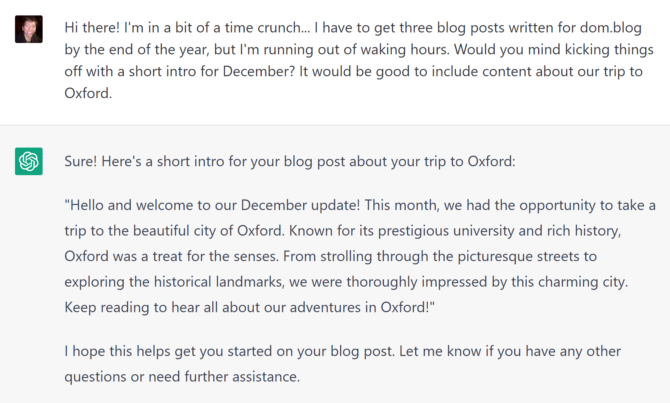
In terms of tone and style I’d say it’s basically there.
Content-wise, however, this human still has a bit to add, starting with the extraordinarily generous wedding present we received of an overnight stay (and seven-course dinner!) at Le Manoir aux Quat’Saisons in Oxfordshire. A surprising number of people seem to be familiar with this luxury boutique hotel, and even I had heard of Raymond Blanc. Suffice to say, it’s not the sort of place that Randi or I would ever dream of eating or sleeping at, so having received this gift we decided to make the most of the weekend by travelling up to Oxford on Friday night and exploring a little more of the city first before our check-in to Le Manoir on Saturday afternoon.

I’ve been to Oxford a few times on short visits, but this time we roamed slightly further than the “picturesque streets” and “historical landmarks” (thanks, GPT3) of the city centre. In particular, we loved the picturesque winter vibes of University Parks, which were further enhanced by staying within the expansive grounds of St Hugh’s College, which Randi discovered offers its student accommodation as a relatively cheap bed for the night (at least during the holidays) and also throws in a hot breakfast in the dining hall the next morning. Would recommend.
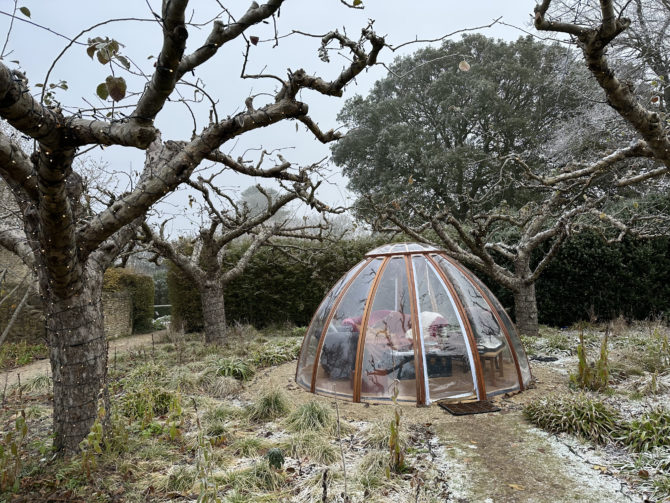
Anyway – if you have infinite money, I’d also recommend Le Manoir because it was rather nice. The dinner itself was incredible, as you’d expect, but – just as importantly – our waiter made us both feel relaxed and was happy to chat about his experiences working there. My only regret was that by the end I was too full for the optional bonus cheese course. Fortunately we could opt for room service breakfast the next morning (plus the FT), which was carried in on an enormous tray and contained a number of bonus items which its bearer (correctly) judged would make “nice additions” to the meal. We agreed.

I do realise that you’re supposed to expect an ultra-luxury hotel to be nice but we still felt very grateful for everything we received there, including the warmth and friendliness of the staff. And I was also pleased that they weren’t so fancy to not stock a selection of nearby walks for us to pick from on Sunday morning, allowing us to walk off some of Raymond Blanc’s cooking by meandering along snowy country roads through various pretty villages before making our way back home again, ‘bon voyage’ bag in tow. (If this all feels a bit like an influencer post, I apologise. Standard disclaimer: we enjoyed a free stay at Le Manoir, but all thoughts, opinions and greedy bites of their complimentary lemon cake are my own.)
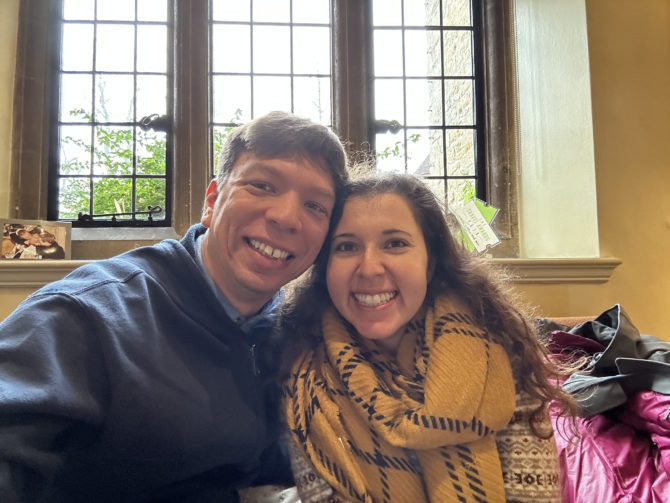
Back in the real world, December has been packed with fun stuff. While Randi was gallivanting in Edinburgh I went along to our neighbour’s primary school Christmas fair with Angela and her family, which was delightful (a) because I’d heard a lot about them already, and (b) because it’s hilarious how immediately recognisable any primary school hall is, from the climbing frame to the little red handheld beanbags.
I also spent a lovely morning in West Hampstead with Josh, Anna and Cora, attended a high-spirited work dinner (in which I learnt everything there is to know about Rutland) and chatted away merrily at the office Christmas party. Since my team is mostly outside the UK, we also enjoyed another virtual board game night to celebrate a productive and successful year (7 Wonders: Architects was particularly fun!) although, as usual, the only way to beat Kira is to choose a game like Ticket to Ride which she’s never played before… and even then, it was too close for comfort.

Meanwhile, Randi and I briefly hosted Esther on the first snowy night of December, who rather magnificently managed to arrive on the last train before they all stopped. One Sunday afternoon we also played at being proper grown-ups and went along to one of our neighbour’s Christmas gatherings for mulled wine, cheese and controversial cocktails. The couple who hosted have a good neighbourly track record, having successfully organised the installation of some bike storage along with the planting of some street trees earlier this year, and I’m really excited to see the latter grow next year.
But on top of all that, two huge pre-Christmas highlights of December were going to a couple of live shows! You’ve almost certainly heard of the first one, Six, in which the six wives of Henry VIII reclaim their narratives through an 80-minute musical/pop concert of catchy songs, historical revisionism and dirty jokes. I’ve wanted to see this for ages, ever since Spotify snuck one of the tracks into my Discover Weekly playlist, and it didn’t disappoint. The tone is fun and light-hearted – Hamilton this ain’t – but it really works, especially if you grew up in the British school system. And of course I’ve had the album on replay for the last week.
Even better, though, was A Sherlock Christmas Carol on Christmas Eve Eve. This is, as the name suggests, a mashup of Dickens and Sherlock Holmes, which is a sentence so laser-targeted at me that I bought tickets as soon as I read it without reading anything else. Everything is woven together perfectly, with some lovely touches to knit the universes together (the boy Ebenezer Scrooge pays at the end of A Christmas Carol to fetch the turkey for Bob Cratchit turns out to be a young Watson) and excellent performances from the cast throughout.
With the Christmas spirit well and truly unleashed, everything was set for our family’s annual gathering at my mum’s. As usual, we played games (Shout Out, Balderdash & Sushi Go Party) and continued our new morning tradition of Secret Santa on the big day itself (many thanks to Cormac for my gifts this year!), followed by a stupendous lunch at Carolyn’s, a format-bending edition of the infamous Christmas Quiz and a closing party game of Empires which Tash introduced us all to. The next day, my mum was inspired to make tacos for a Boxing Day brunch – if this turns out to be a new tradition, I’m definitely not complaining – before we set off for Hampstead Heath.
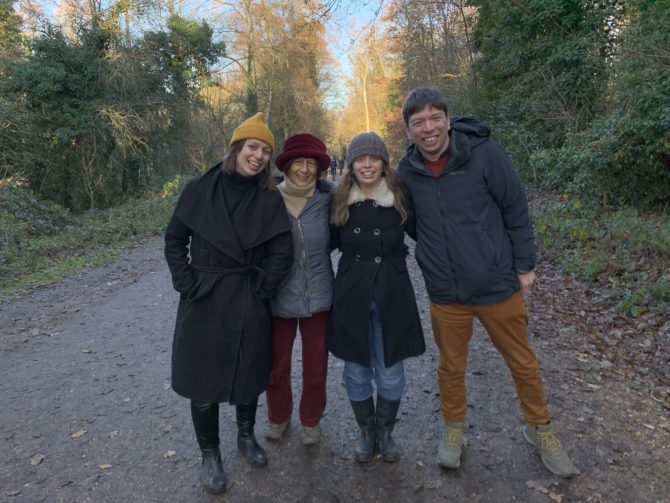
If you’re a regular reader – and let’s be honest, I don’t think anyone is picking up at this point – you’ll know that this is usually the week that I churn out my annual reviews and roundup of the year’s books. Everything was all planned out for a mammoth blog-writing session yesterday, with Randi having safely departed in an early morning cab for a solo trip to New York and Chicago to see friends. And then, in a single gatecrashing text, came some very exciting news: Nolan and Rebecca had just flown into town that very morning, and did I fancy a pint? Hell yes.
A few hours later we were gathered around a pub table in Camden with their wonderful friends Celia and Parrus, swapping life updates and lots of laughter after a multi-year gap. It may have cost me my blog writing timetable (and therefore some spillover into 2023 – sorry!) but it was worth it for such an unexpected and delightful reunion. I hope that you’ve all had a chance to spend some time with people you love over the holidays, and I hope you’ve enjoyed “our December update” for 2022.
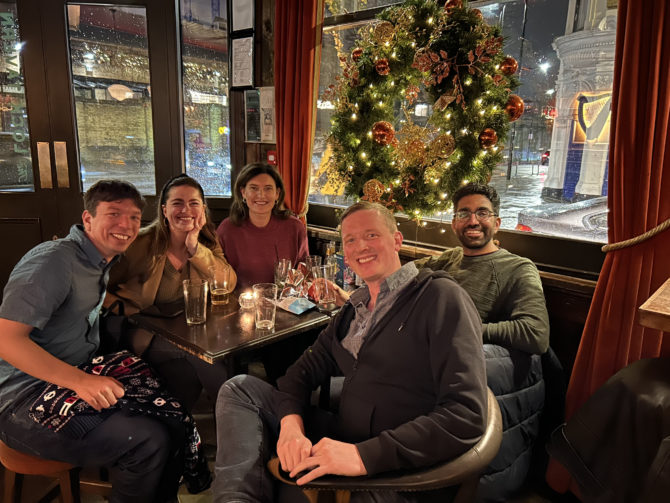
Belated Happy Thanksgiving! This year, we took advantage of Katie being in London to celebrate one weekend early, reuniting most of our 2019 Thanksgiving crowd for Randi’s menu of cheesy broccoli casserole, corn pudding and sumptuous mashed potato. And, in an autumnal twist to my ‘first mulled wine of the season’ ribbon-cutting moment, we also enjoyed a large pot of warming mulled cider as we gave thanks for things in alphabetical order and played some riotous rounds of Happy Salmon: the party card game where everyone plays (and yells) at once. My guess is that the playtesting of these games doesn’t consider first-floor terraced flats with neighbours in three of four directions – sorry! – but it’s Thanksgiving, and you gotta have fun on Thanksgiving.
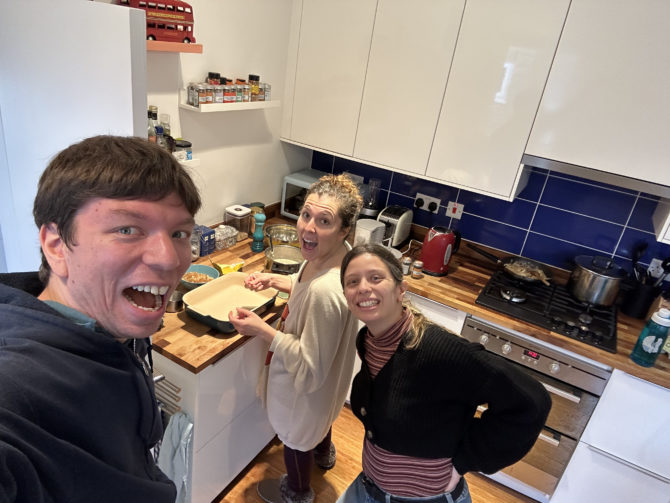
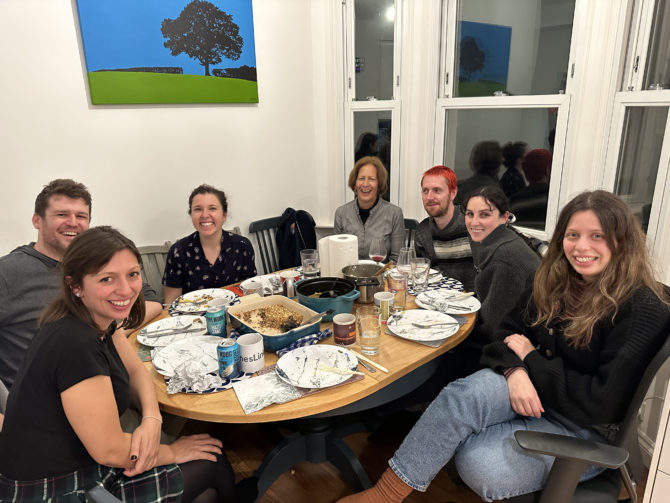
Katie stayed with us for a few more days, including the slightly surreal working hours where we worked together from the same home office. (While we didn’t get a chance to try switching jobs and seeing if anyone noticed, I can confirm that we both adopt the same unhealthily hunched position in an office chair. Not sure if this is a Tash thing too.) Aside from work, we also redeemed the Monopoly Lifesized tickets which Katie bought me for my birthday, and I’m delighted to say that – together with our team mates Andy and Jade, plus our ‘Scotty dog’ human Monopoly token – we came second out of four competing teams! Although, if we’re being honest, our purchase of the Gas Company should have immediately guaranteed victory in these troubled times.
In case you’re wondering how Monopoly Lifesized is actually played: although in theory there are escape room-esque challenges to complete on each board square in order to build property, in reality they are all pretty easy and the predominating spirit is really ‘zany novelty fun’ rather than anything very competitive. I really enjoyed it, and our meal in the Top Hat restaurant afterwards, although it does sadden me that Hasbro insist on repeating the false ‘Charles Darrow invented Monopoly’ story even though the true origin has been documented over and over again for decades now. And the true origin – it was invented by Elizabeth Magie as an economic satire and had a whole ‘anti-monopolist’ second set of rules – is just much more interesting than “some guy made it up for no reason”.

But the original reason for Katie’s visit was to go see Ingrid Michaelson’s Christmas concert. Through bitter misfortunes Katie has waited maybe half her life to see Ingrid Michaelson perform live, and we were eager to join her after an eight-year gap. (Wait, eight years? Really? That’s frightening.) Despite the fact that almost everything Katie told us about the gig was a lie (we could not buy drinks, there was no standing section, and it was not exclusively Christmas themed) we loved the show, which alternated between Ingrid classics – including the song we chose for our wedding ceremony – and festive songs.


Recently we also hosted Randi’s colleague Daniela for a sleepover, while I had another pub meetup with my uncle Andrew and attended the 2022 Travolution awards with some colleagues from work. (Props to the comedian Rhys James for making the most of a corporate awards gig.) And last weekend, I was very excited to make a rare outing to the cinema with Randi to see Glass Onion, the sequel to 2019’s Knives Out in which Daniel Craig returns as master detective Benoit Blanc. Massive thanks to Katie for tipping us off that Netflix had begrudgingly allowed a tiny theatrical release, because it’s a wonderful film and we both laughed a lot all the way through. Bring on the next one!
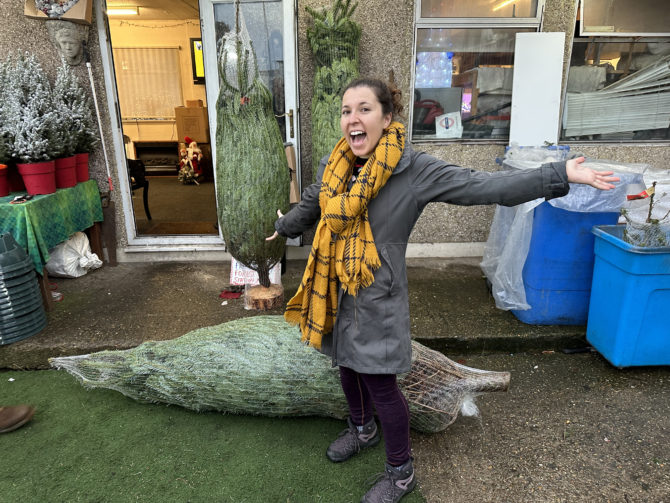
Finally, a confession: this year we broke the rule that you don’t get a Christmas tree before December. In our defence, Randi will be out of town just after Christmas, so she wanted to maximise her exposure while she was still around. And all of the preceding events in this post had already put us in a holiday mood. So, please forgive us. It’s also a particularly big specimen this year, which we didn’t fully appreciate until we got it home and realised the top was firmly out of Randi’s reach…
